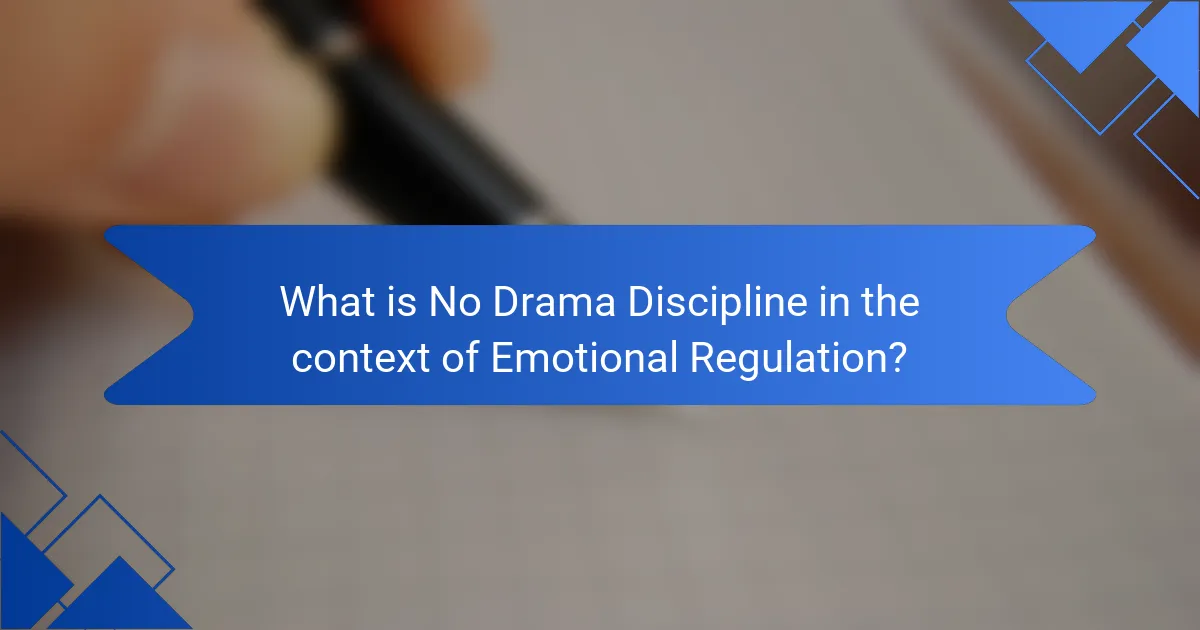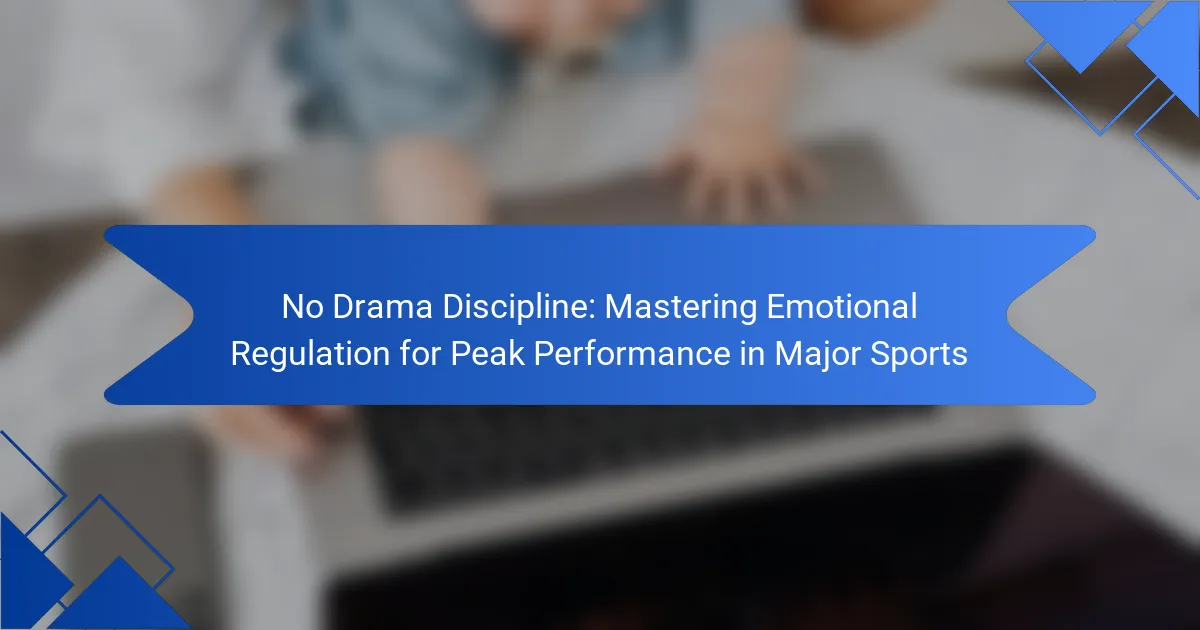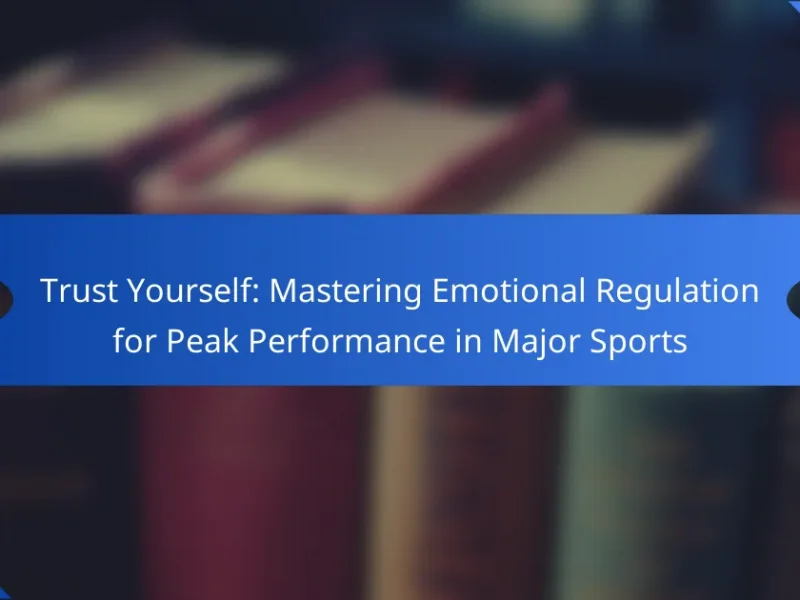Mastering emotional regulation is crucial for athletes aiming for peak performance in major sports. No Drama Discipline fosters awareness, control, flexibility, resilience, and expression of emotions. This approach integrates mindfulness techniques and emphasizes effective communication, enhancing focus and resilience. By creating a supportive environment, athletes can improve their performance outcomes and manage emotions under pressure.

What is No Drama Discipline in the context of Emotional Regulation?
No Drama Discipline focuses on fostering emotional regulation, essential for athletes to maintain peak performance. This approach emphasizes understanding emotions, promoting effective responses, and minimizing disruptive behaviours. By integrating mindfulness techniques, athletes can enhance their focus and resilience, leading to improved performance outcomes. Research indicates that emotional regulation directly influences athletic success, making No Drama Discipline a valuable framework for sports training.
How does Emotional Regulation impact performance in major sports?
Emotional regulation significantly enhances performance in major sports by improving focus, resilience, and decision-making. Athletes who master emotional regulation can maintain composure under pressure, leading to better performance outcomes. Studies indicate that emotional regulation skills can increase an athlete’s ability to handle stress, resulting in improved consistency and overall results. For instance, athletes who practice mindfulness techniques report higher levels of emotional control, which correlates with enhanced performance metrics.
What are the core principles of No Drama Discipline?
No Drama Discipline emphasizes emotional regulation to enhance performance in sports. The core principles include fostering a supportive environment, understanding the reasons behind behaviour, and teaching problem-solving skills. These principles aim to develop resilience and self-control, crucial for athletes facing high-pressure situations. By focusing on connection rather than punishment, athletes learn to manage their emotions effectively, leading to improved performance and teamwork.
How can athletes apply these principles in practice?
Athletes can apply the principles of No Drama Discipline by practicing emotional regulation techniques. These include mindfulness, which enhances focus and reduces stress, and visualization, which prepares the mind for competition. Developing routines for pre-competition and in-game situations can help maintain composure under pressure. Additionally, setting specific performance goals fosters accountability and encourages a disciplined approach to training and competition. Engaging in regular self-reflection aids in recognizing emotional triggers, thereby improving overall performance.

What are the universal attributes of Emotional Regulation Systems?
Emotional Regulation Systems universally encompass awareness, control, flexibility, resilience, and expression. These attributes are crucial for athletes to manage emotions effectively during high-pressure situations. Awareness facilitates recognizing emotional states, while control allows athletes to modulate responses. Flexibility enables adaptive strategies, resilience fosters recovery from setbacks, and expression supports healthy communication. Together, these attributes enhance performance and well-being in sports contexts.
How do emotional triggers affect athletic performance?
Emotional triggers significantly impact athletic performance by influencing focus, motivation, and stress levels. Athletes who master emotional regulation can maintain composure under pressure, enhancing their decision-making and execution during competitions. Emotional intelligence, a unique attribute, allows athletes to harness feelings constructively, leading to improved outcomes. Studies show that athletes with high emotional regulation skills often achieve better results, demonstrating the value of emotional management in sports.
What strategies are commonly used for emotional regulation?
Common strategies for emotional regulation in sports include mindfulness, cognitive restructuring, and breathing techniques. Mindfulness enhances awareness of emotions, allowing athletes to manage reactions effectively. Cognitive restructuring helps athletes reframe negative thoughts, promoting a positive mindset. Breathing techniques provide immediate stress relief, aiding in focus and composure during competitions. These approaches collectively foster peak performance by maintaining emotional balance.
What role does self-awareness play in managing emotions?
Self-awareness is crucial for managing emotions in sports. It enables athletes to recognize their emotional triggers, facilitating better emotional regulation. By understanding their feelings, athletes can respond to stress and pressure more effectively, enhancing performance. Self-aware athletes often develop strategies to maintain composure, leading to improved decision-making during competitions. This mastery of emotional regulation ultimately contributes to peak performance in major sports.
How can visualization techniques enhance emotional control?
Visualization techniques significantly enhance emotional control by allowing athletes to mentally rehearse scenarios, reducing anxiety and improving focus. These techniques create mental imagery that fosters a sense of preparedness and confidence, essential for peak performance in sports. Research shows that athletes who utilize visualization report better emotional regulation, leading to improved decision-making under pressure. This unique attribute of visualization helps athletes manage stress responses effectively, ultimately enhancing their overall performance.

What unique attributes differentiate No Drama Discipline?
No Drama Discipline is distinguished by its focus on emotional regulation, fostering resilience, and enhancing communication between parents and children. Unique attributes include the integration of neuroscience principles, promoting empathy, and emphasizing long-term behavioural change. This approach contrasts with traditional discipline methods that often rely on punitive measures. Additionally, it encourages a collaborative problem-solving process, empowering children to understand their emotions and responses.
How does the approach vary between individual and team sports?
The approach to emotional regulation varies significantly between individual and team sports. Individual sports often require athletes to develop self-reliance in managing emotions, as they face competition alone. In contrast, team sports emphasize collective emotional regulation, where athletes must navigate group dynamics and support each other.
Individual athletes may use techniques like visualization and self-talk to maintain focus. Team athletes, however, benefit from communication strategies and shared accountability to enhance emotional resilience. Both approaches aim to optimize performance, but the context and methods differ based on the nature of the sport.
Understanding these differences can help coaches tailor emotional regulation training to meet the specific needs of athletes in various sports. This targeted approach can lead to improved performance outcomes and a healthier competitive environment.
What are the specific benefits of No Drama Discipline for athletes?
No Drama Discipline enhances athletes’ emotional regulation, leading to improved focus, resilience, and performance. This approach fosters a positive mindset, reducing anxiety and enhancing teamwork. Athletes learn to manage stress effectively, leading to better decision-making during competitions. Additionally, it promotes accountability, encouraging athletes to take ownership of their actions and growth.
In what ways does it foster team cohesion?
No Drama Discipline fosters team cohesion by promoting emotional regulation and mutual respect. It encourages open communication, reducing conflicts and misunderstandings. Teams practicing these principles report higher trust levels and collaboration, leading to improved performance. The unique attribute of this approach is its focus on self-awareness, which enhances interpersonal relationships within the team. As a result, athletes can work together more effectively, fostering a supportive environment that drives success.
How does it enhance decision-making under pressure?
No Drama Discipline enhances decision-making under pressure by fostering emotional regulation. Practicing this discipline allows athletes to maintain focus, reduce anxiety, and improve clarity in high-stress situations. As a result, they make quicker, more effective decisions during critical moments in competition. Techniques such as mindfulness and cognitive reframing are key attributes that contribute to this heightened performance. Studies show that athletes who master these skills experience a significant improvement in their decision-making accuracy under pressure.

What are the rare attributes worth noting in Emotional Regulation Systems?
The rare attributes worth noting in Emotional Regulation Systems include adaptability to diverse emotional contexts, integration of cognitive and emotional processes, and the ability to enhance performance under pressure. These attributes facilitate athletes’ resilience and decision-making, ultimately leading to improved outcomes in high-stakes situations.
What unique challenges do athletes face in high-stakes environments?
Athletes in high-stakes environments face unique challenges that test their emotional regulation. High pressure can lead to anxiety, which affects performance. Additionally, intense competition creates a fear of failure, further complicating emotional stability. Mastering emotional regulation is crucial for maintaining focus and achieving peak performance. Factors such as crowd expectations and media scrutiny can amplify stress, making discipline essential for success.
How can cultural factors influence emotional regulation in sports?
Cultural factors significantly shape emotional regulation in sports by influencing athletes’ responses to stress and competition. These factors include societal norms, values, and expectations that dictate how emotions are expressed and managed. For instance, cultures that prioritize collectivism may encourage athletes to suppress individual emotions for team harmony, impacting their performance. Conversely, cultures that value individualism may promote open emotional expression, fostering resilience and adaptability. Understanding these dynamics is crucial for coaches and sports psychologists to tailor emotional regulation strategies that align with an athlete’s cultural background.

What are the best practices for implementing No Drama Discipline?
To implement No Drama Discipline effectively, focus on creating a supportive environment that fosters emotional regulation. Key practices include modeling emotional awareness, encouraging open communication, and emphasizing problem-solving over punishment. Consistency in approach and reinforcing positive behaviours are essential for success. Additionally, integrating these principles into training routines enhances athletes’ ability to manage emotions under pressure, ultimately leading to peak performance.
What common mistakes should athletes avoid when practicing emotional regulation?
Athletes should avoid emotional suppression, overthinking, negative self-talk, and lack of consistency in practice. Emotional suppression leads to increased stress and performance anxiety. Overthinking can disrupt focus and decision-making during competition. Negative self-talk undermines confidence, while inconsistency in emotional regulation practice prevents mastery. Establishing a routine for emotional regulation enhances resilience and performance.
How can coaches support athletes in mastering emotional regulation?
Coaches can effectively support athletes in mastering emotional regulation by implementing structured strategies. These include fostering open communication, teaching mindfulness techniques, and providing consistent feedback.
Open communication creates a safe environment for athletes to express emotions, reducing anxiety and enhancing focus. Mindfulness techniques, such as breathing exercises, help athletes remain present and manage stress during competition. Consistent feedback allows athletes to recognize emotional triggers and develop coping strategies.
Additionally, coaches can model emotional regulation themselves, demonstrating how to handle challenges constructively. This unique approach not only builds trust but also reinforces the importance of emotional mastery in achieving peak performance.
What are the key takeaways for athletes aiming for peak performance?
Athletes aiming for peak performance should focus on emotional regulation, discipline, and mental resilience. Mastering these skills enhances focus, reduces anxiety, and improves decision-making during competition. Key strategies include setting clear goals, practicing mindfulness, and maintaining a consistent routine. By developing emotional intelligence, athletes can better manage stress and optimize their performance.


